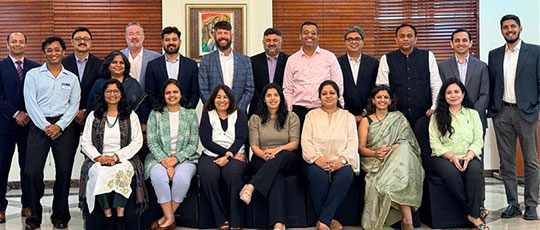For WorldatWork Members
- 5 Minutes With ... Gordon Frost, Mercer’s Global Rewards Solution Leader, Workspan Magazine article
- From Perks to Performance: Total Rewards as a Strategic Force, Workspan Magazine article
- The Future of the Rewards Profession: Let the Sleeping Beauty Rise, Journal of Total Rewards article
- From Broken to Breakthrough: How AI Is Rewiring Performance and Rewards, Journal of Total Rewards article
- Total Rewards Leader 2025 Priorities, research
- Total Rewards Inventory Checklist, tool
For Everyone
- Total Rewards Leaders Share 2025 Goals, Priorities in New Study, Workspan Daily article
- How Will AI Impact TR’s Roles and Strategies Over the Next 5 Years? Workspan Daily article
- Creating Impact Through Total Rewards, course
- Business Acumen and Communication Strategies in Total Rewards, course
As organizations increasingly leverage artificial intelligence (AI) and data analytics, total rewards (TR) leaders have a front-row seat to the evolving future of work. But they are at risk of losing that vantage point, according to a new study from HR consulting firm Mercer.
With compensation and benefits as one of the biggest business expenses for organizations, the study noted executives are struggling to see the full value of rewards. By analyzing responses collected through a series of live interviews with chief human resources officers (CHROs) and TR directors from leading Global Fortune 500 organizations, Mercer identified three strategic essentials for rewards leaders to help them transform into successful “performance architects.”
In an interview with Workspan Daily (WD), Gordon Frost, a global rewards solutions leader at Mercer and the study’s author, shared further insights for TR/HR leaders to ensure rewards is viewed as a much-needed business investment to drive growth and innovation.

Gordon Frost, global rewards solutions leader, Mercer
WD: What are some key findings you can share from the report?
Frost: The report found leading CHROs and heads of rewards see a clear opportunity to revolutionize the rewards function and the role of the rewards leader. We identified three strategic imperatives that will allow rewards leaders to transform themselves and their teams into true strategic business partners:
- Simplify and automate to elevate your impact.
- Leverage rewards to drive clear business results.
- Connect across the firm for exponential success.
WD: What did the results tell you about the TR profession?
Frost: The profession is at a true point of transformation. Those who don’t adapt run the risk of becoming obsolete, replaced by AI agents and process automation. Those who embrace change can elevate themselves and their teams into true strategic leaders — uncovering insights that drive clear business results and improved organizational performance.
WD: The study states traditional approaches are failing. How so? And, why should rewards leaders embrace emerging technologies?
Frost: Spending on total rewards continues to increase — for many companies, compensation and benefits is their single-largest expense item — and yet almost half of employees say their needs are not being met, and executives do not consider further investments in total rewards as a top priority. This clear disconnect requires rewards leaders to take a fundamentally different approach.
New technologies, like generative AI and robotic process automation, provide a golden opportunity to redirect rewards teams toward more high-value activities that have strategic impact. However, technology alone is only part of the solution. Our research found simplification is also critical. Automating old and outdated rewards programs may provide some minor gains in productivity, but organizations that first take the time to modernize their job architectures, consolidate their job catalogs and simplify their incentive programs, to name a few, can then leverage AI to perform more sophisticated analytics that result in meaningful insight.
WD: How can organizations leverage rewards to drive clear business results?
Frost: Organizations can connect disparate data sets, such as rewards data, other HR data, business performance data and even potentially external data (e.g., labor market data, socio-economic data), to drive strategic insights that improve business decisions. For instance, TR/HR leaders may consider:
- What investments, initiatives or actions will improve the retention of employees in a critical job family or location?
- What incentives or recognition programs will drive improved performance in a key business segment?
- What exact mix of total rewards will result in improved attraction of talent in a highly competitive marketplace?
WD: Why are strategic partnerships important to a TR strategy?
Frost: Leading CHROs and heads of rewards agree the rewards team cannot exist in a silo. To drive exponential success, they need to create partnerships across the organization to obtain a deeper understanding of the business and of the key drivers of business success. They also need to enable local people managers (with the help of modern technology platforms) to become total rewards evangelists — engaging with frontline employees to ensure they understand the full value of their rewards programs and how they align with key organizational objectives like fairness, transparency and exceptional performance.
WD: How will the future of work impact TR professionals?
Frost: The rapidly evolving world of work is a key driver of the rewards revolution. Jobs are in a constant state of flux, with companies shifting to agile work teams and skills-powered job architectures. Yesterday’s processes of doing annual salary reviews and cumbersome manual job re-evaluations (as just two examples) are no longer fit for purpose. Top rewards professionals need to become more like investment portfolio managers — leveraging real-time data and analytics to constantly rebalance their rewards investments — ensuring they deliver maximum impact to the business and return on investment (ROI).
Editor’s Note: Additional Content
For more information and resources related to this article, see the pages below, which offer quick access to all WorldatWork content on these topics:
#1 Total Rewards & Comp Newsletter
Subscribe to Workspan Weekly and always get the latest news on compensation and Total Rewards delivered directly to you. Never miss another update on the newest regulations, court decisions, state laws and trends in the field.









